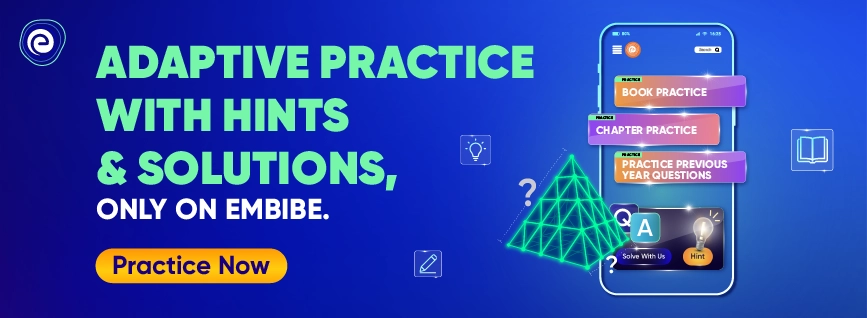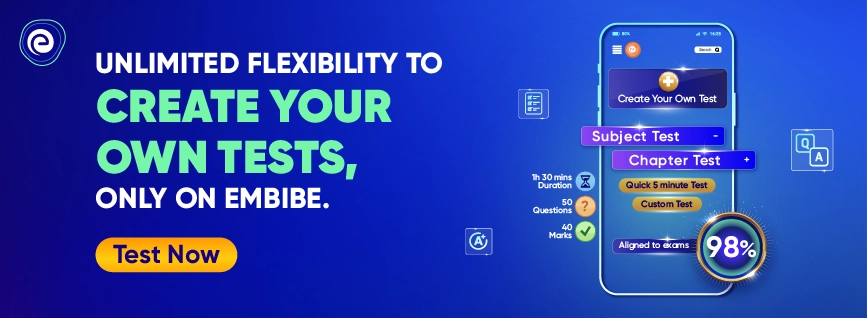- Written by Sankhanil Sengupta
- Last Modified on 16-12-2024
Exam Brief
NTSE Stage I Punjab: NTSE test is India’s most prestigious exam and part of the government’s National Scholarship Programme. It is not only a matter of scholarship for every student to be recognised as the nation’s talent, but it is also a source of great pride and honour.
Every year, the NTSE (National Talent Search Examination) is held at two levels: Stage I (State Level) and Stage II (National level). States administer NTSE Stage I, whereas NCERT administers NTSE Stage II.
Brochure
The brochure is available here: NTSE
Exam Summary
The National Talent Search Examination (NTSE) is an offline NTSE Scholarship exam for students in grades 10 and up to encourage them to pursue higher education in the sciences and social sciences.
NTSE 2025 Highlights
| Particulars |
Details |
| Exam Level |
NTSE Stage-I Punjab: State-level
Stage-II: National level |
| Frequency |
Once in a year |
| Mode of Application |
Both online & offline |
| Eligibility |
Students should be pursuing Class X and be below 18 years of age. |
| Exam Mode |
Offline- Pen and paper-based |
| Exam Duration |
MAT: 2 hours
SAT: 2 hours |
| Language |
Stage-I: English or any regional language as opted by the candidate.
Stage-II: English or Hindi |
| Official Website |
NTSE Punjab |
Official Website Link
http://www.ssapunjab.org.
Selection Process
NTSE Stage 1 Punjab is the first step in the selection process. The different States and Union Territories are in charge of this stage. Exam centres for NTSE Stage I Punjab 2025 are found in this state.
- The purpose of this exam is to recommend a number of applicants for the NCERT 2nd level test.
- The NTSE initial stage consists of two papers.
- The Mental Ability Test (MAT) is Paper 1 and consists of 100 multiple-choice questions (MCQs) with a time limit of 120 minutes.
- Paper 2 is the Scholastic Aptitude Test (SAT), which has 100 multiple-choice questions and a time limit of 2 hours or 120 minutes.
Minimum qualifying marks of NTSE Punjab stage I
| Exam Feature |
Mental Ability Test |
Scholastic Aptitude Test |
| Minimum Qualifying Marks |
32% for SC, ST and PWD and 40% for Others (General & OBC) |
32% for SC, ST and PWD and 40% for Others (General & OBC) |
While applicants from various Indian states and union territories are taking the state-1 test, interested students should be aware of the NTSE 2025 quota allocated to states and union territories. For Punjab quota is 183. Here’s a list of quotas from your state or the state you’re presenting:
| States/UTs |
Quota |
| Andaman & Nicobar Islands |
20 |
| Andhra Pradesh |
263 |
| Arunachal Pradesh |
50 |
| Assam |
202 |
| Bihar |
691 |
| Chandigarh |
20 |
| Chattisgarh |
195 |
| Dadra & Nagar Haveli |
20 |
| Daman & Diu |
20 |
| Delhi |
153 |
| Goa |
50 |
| Gujarat |
360 |
| Haryana |
186 |
| Himachal Pradesh |
51 |
| Jammu & Kashmir |
64 |
| Jharkhand |
142 |
| Karnataka |
371 |
| Kerala |
220 |
| Lakshadweep |
20 |
| Madhya Pradesh |
530 |
| Maharashtra |
774 |
| Manipur |
50 |
| Meghalaya |
50 |
| Mizoram |
50 |
| Nagaland |
50 |
| Odisha |
259 |
| Puducherry |
20 |
| Punjab |
183 |
| Rajasthan |
485 |
| Sikkim |
50 |
| Tamil Nadu |
466 |
| Telangana |
216 |
| Tripura |
50 |
| Uttar Pradesh |
1408 |
| Uttarakhand |
79 |
| West Bengal |
569 |
| TOTAL |
8387 |
Stages of Exam
NCERT administers this test in two stages.
- Stage 1 is administered by SCERT or another state authority, and
- Stage 2 is administered by NCERT at the national level.
NTSE Stage I Punjab Exam Pattern 2025
- NTSE stage 1 consists of 200 questions divided into two sections, MAT and SAT, each worth 100 points.
- The question papers will be written in English, Hindi, and Punjabi.
- Students must complete all of the questions using exclusively offline or pen and paper methods.
- There will be no negative marking in the NTSE Punjab Stage 1 exam, and each correct answer will receive one mark.
- The SAT part will have 100 questions (Science-40, Math-20, Social Science-40) and will be used to assess students’ knowledge and abilities.
- Pattern perception, analogies, coding-decoding, classifications, hidden figures, and problem-solving will all be covered in the MAT section.
- For NTSE Result 2025, students will be chosen if they qualify for both papers individually.
| Sections |
Exam pattern |
Marks per Question |
Time Duration |
Qualifying criteria |
| Mental Ability Test (MAT) |
100 questions |
1 Mark |
120 minutes |
General: 40% (40 marks)
ST/SC/PH: 35% (35 marks) |
| Scholastic Aptitude Test (SAT) |
100 questions |
1 Mark |
120 minutes |
General 40% (40 marks)
ST/SC/PH 35% (35 marks) |
Exam pattern details - Scoring pattern (+/- Marking)
- 1 mark is given for every correct answer for both stage 1 and 2.
- And there will be no negative marking.
Exam Pattern details – No. of Qs subject-wise
Following table gives the information of numbers of question asked subject wise:-
| Test |
Total no. of Questions |
| Mental Ability Test (MAT) |
100 |
| Scholastic Aptitude Test (SAT) |
100 |
Exam pattern details - Total time
Following table gives the information of total time of the NTSE Stage I Exam Punjab
| Test |
Total time |
| Mental Ability Test (MAT) |
120 |
| Scholastic Aptitude Test (SAT) |
120 |
Exam Calendar
NCERT is yet to announce the official NTSE 2025 examination dates. However, it will be made available on the NCERT website soon.
However, the following are the tentative dates for NTSE Stage 1 Punjab exams:
| State / Union Territory |
Dates |
| NTSE exam date for all states & Union territories |
January, 2025 |
| NTSE exam date for Mizoram, Nagaland, Meghalaya, and Andaman, and Nicobar Islands (Stage 1) |
January, 2025 |
Exam Syllabus
NTSE Stage I Punjab Syllabus
| Section |
NTSE Syllabus |
| Mental Ability Test |
Verbal reasoning test: alphabetic test, analogy, analytic reasoning, arithmetic reasoning, blood relations, coding-decoding, direct sense test, fill in the blanks, word sequencing, Venn diagrams, questions on direction, word problems, clock problems, series completion test, truth verification, hypothetical situations.
Non-verbal reasoning test- Questions will be based on: analogy, analytic reasoning, dot fixing situation, classification, embedded figures, folding/ cutting paper, completing the figures, mirror images, problems on cubes and dice, transparent paper folding, water images. |
| Scholastic Ability Test (SAT) |
Mathematics: Algebra-expressions, arithmetic progression, basic geometry, circles, coordinate geometry, direct & inverse variations, exponent, linear equation, number system, probability, quadratic equations, simple & compound interest, square root and cube root, triangles, trigonometry, statistics, surface area and volume.
Science: acid, bases and salts, air, carbon and its compounds, cellular level of organisms, diversity in living organisms, fibres and plastics, food production and management, light, magnetism & electricity, evolution, measurement, metals & non-metals, environment, periodic classification of elements, physical & chemical changes in matter, source of energy, the structure of an atom, water.
Social sciences:
History: culture, science, & literature, the early medieval period, Indus valley civilization, introduction of ancient Indian history, Jainism, Buddhism, and conquerors from other countries and nations, medieval architecture and culture, national movement, new empires and kingdoms, popular movements and social reforms, the revolt of 1857, the Mauryas, Mughal empire, Vedic period.
Civics: democracy, diversity and livelihood, economic presence of the government, India & its neighbouring countries, state government, judiciary, UN & other international agencies, Union government.
Geography: agriculture, atmosphere, industries, the internal structure of earth and rocks, major domains and land-forms, maps and globe, motion of the earth, natural vegetation, environment of India, resources and development, solar system. |
Study Plan to Maximise Score
Preparation Tips
Candidates can follow some preparation tips to score well in NTSE Stage I Punjab:-
- To cover the entire NTSE Stage 1 Punjab syllabus, create a study strategy and devote time to each area before beginning preparation.
- Find your weak spots on the NTSE MAT and NTSE SAT topics and start working on them.
- Make brief notes; these handwritten notes will help you swiftly understand and revise the entire course.
- After covering all topics in the stage 2 NTSE Syllabus, try to solve previous year’s papers and figure out the applicable themes.
- Examine and learn from your mistakes; practise time management by completing NTSE previous year question papers within the allocated time.
Some of the best books for NTSE Stage I Punjab
| Best Books for NTSE |
Author |
Publisher |
| Study Package for NTSE, 5e Paperback – 10 January 2019 |
Stalin Malhotra |
McGraw Hill Education Pvt. Ltd. |
| Practice Test Papers for NTSE Class X 1st Edition |
McGraw Hill Education |
Tata McGraw Hill Publications |
| Pearson Guide to NTSE Class 10 (English) 1st Edition |
Saurabh Priyadarshini and Navin C. Joshi |
Pearson India |
| A comprehensive Manual for NTSE for Class X (English) |
Abhijit Guha, N.D. Arora, V. Sasikumar, Divya Johry, Majid Husain |
Access Publishing |
| Study Guide for NTSE National Talent Search Examination Class 10 (English) |
Disha Experts
|
Disha Publication |
| MTG NTSE Explorer (2012-13 solved Papers ) MAT+SAT +ENGLISH Language Test Paperback– 2013 |
Sonia Lal |
MTG Learning Media Private Limited (2013) |
| Lakshya NTSE – Class 10 (Study Material + Mock Papers + Motivational Book and CD) |
AIETS Experts |
Disha Publication |
| National Talent Search Examination (NTSE) Guide for 10th Class: with Previous Papers (Solved) (Big Size): For Stage, I and Stage II (Popular Master Guide) |
RPH Editorial Board |
RPH; 2019 edition |
| NTSE for Class X Paperback– 2013 |
Trishna Knowledge Systems |
Pearson; First edition (2013) |
| Target NTSE Class 10 (MAT + SAT) – Solved Papers Stage 1 & 2 + 5 Mock TestsPaperback– 2013 |
Disha Experts |
Disha Publication (2013) |
Apart from referring to the best NTSE books, one must be attentive and comprehensive with each and every topic contained in the syllabus to pass the NTSE exam. We’ve put together a list of NTSE Preparation ideas to help you pass this aptitude test.
- Self-study is crucial – clearing any competitive exam requires a significant amount of time spent studying from the top resources for NTSE. Students studying for NTSE stage I Punjab exam should set out at least three to four hours for self-study. Always remember that memorizing the syllabus will not help you, so make sure you fully comprehend each and every idea.
- Strengths and Flaws Must Be Recognized – Students must be aware of their own strengths and weaknesses. If you are strong in mathematics and physics but average in language and weak in social science, focus on improving your weak areas to raise your overall score.
- Best Books for NTSE – The best books for NTSE 2025 can help you improve your understanding in both MAT and SAT papers. Refer to the aforementioned publications for enough exam practice, as they contain example tests and exercise questions.
- Strengthen Your MAT Section – This paper assesses a candidate’s capacity to reason, think, judge, and analyze in order to discriminate. Candidates should practise questions based on analogies, classification, hidden figures, block assembly, and problem-solving from the finest NTSE publications.
- Work on Your SAT Exam – To prepare for the scholastic aptitude section, candidates should use the Best books for NTSE for SAT listed above. They should also read a decent general knowledge book to prepare for ‘out of class’ questions. This area contains questions from the social sciences, science, and mathematics. Students should read NCERT history books for classes 9 and 10, as these are the best NTSE history books.
- Solve NTSE Sample Papers- In addition to consulting the top books for NTSE, solving NTSE sample papers will assist you in comprehending the exam format and difficulty level. Make every effort to complete the paper within the allowed time. Previous year’s NTSE question papers can also be used as practice papers. This will help in boosting your speed and accuracy.
Detailed Study plan
NTSE is a timed exam in which you must demonstrate your speed and accuracy in answering questions. You’ll need to practise with sample tests and NTSE previous year papers to prepare for this.
You must follow a precise study strategy for NTSE 2025 that can assist you in getting exam-ready, in addition to answering mock tests and previous year papers. For all NTSE aspirants, below is a complete study plan:
| Time |
Activity |
What to study |
Total hours |
| 6.30-7.30 AM |
Get up and complete your morning tasks (Flex your brain and get ready to study). Meditate for 15 minutes every day while getting ready for school to boost your concentration. |
– |
– |
| 8.00- 3:00 PM |
Go to class/coaching/school |
Pay close attention in class to what is being taught. Make a point of writing down everything in your notes, as this will come in handy later in the preparation process. |
6-7 hours |
| 3:00-4:30 PM |
Come home, eat lunch and relax for a while |
– |
1.5 hours |
| 4:30- 5:30 PM |
Revise |
Make use of this opportunity to review what you learned in class. Re-read your notes. Always remember to properly comprehend your themes from the NCERT. |
1 hour |
| 5:30 – 6:30 PM |
Go out for some exercise |
Exercise is essential for improving focus, so make it a point to exercise for one hour every day. |
1 hour |
| 6:30 – 9:30 PM |
Practise |
This is the optimum moment to take Embibe’s concept tests. Whatever idea you learned during the day, make sure you test yourself on it to see whether you understand it. |
3-hours |
| 9:30 PM – 10:30 PM |
Take a Break. Have dinner. Just unwind yourself. |
|
1 hour |
| 10:30 – 12:00 AM |
Study |
Choose a subject that interests you and make it a point to learn three new topics every day before bed. The next day, revise them. |
2.5 hours |
| 12:00 AM – 12:15 AM |
Make a list of things you’ll study the next day and retire to your bed. |
|
15 mins |
Recommended Chapters
The important topics of MAT syllabus is mentioned below.
| Topics |
| Verbal and Non-Verbal Analogy |
Verbal and Non-Verbal Series |
| Classification |
Coding-Decoding |
| Alphabet and Number Test |
Blood Relations |
| Distance and Direction |
Paper Cutting and Folding |
| Venn Diagrams |
Mathematical Operations |
| Calendar, Time, and Clock |
Missing Characters |
| Embedded Figure |
Ranking and Arrangements |
| Word Problems |
Cube and Dice |
| Water and Mirror Images |
|
The important topics of SAT syllabus is mentioned below.
Important topics of Science:-
| Subject |
Topics |
| Physics |
Magnetism and Electricity |
| Motion and Force |
| Measurements |
| Work and Energy |
| The Universe |
| Light and Sound |
| Source of Energy |
| Chemistry |
Acid, Bases, Salt |
| Metals and Non-metals |
| Periodic Classification of Elements |
| Structure of Atom |
| Carbon and its Compounds |
| Physical and Chemical Changes |
| Fibers and Plastics |
| Biology |
Air |
| Soil |
| Water |
| Micro-organisms |
| Life Processes |
| Reproduction |
| Heredity and Evolution |
| Food Production and Management |
| Plant and Animal Nutrition |
| Diversity in Living Organisms |
| Cellular Level of Organisation |
| Human Body |
| Some Common Diseases |
| Our Environment |
Important topics of Mathematics
| Topics |
| Algebraic Expressions |
Arithmetic |
Arithmetic Progressions |
| Basic Geometry |
Circles |
Coordinate Geometry |
| Direct& Inverse Variations |
Exponent |
Linear Equation |
| Mensuration |
Number System |
Percentage& Its Application |
| Playing with Number |
Probability |
Quadratic Equations |
| Rational Numbers |
Simple & Compound Interest |
Square & Cube Roots |
| Statistics |
Surface Areas and Volume |
Triangles |
Important topics to be covered in Social Science are:-
| Topics |
| Agriculture |
Atmosphere |
Biosphere |
| British raj |
Culture, Science and Literature |
Democracy and Elections |
| Diversity and Livelihood |
Early Medieval Period |
Early States |
| Eighteen Century Political Formation |
French Revolution |
India and Its Neighbours |
| Indian Constitution |
Indian Economics |
Indiandom Struggle |
| Indus Valley Civilization |
Industrial Revolution |
Industries |
| Internal Structure of the Earth and Rocks |
Introduction and Sources of Ancient Indian History |
Jainism, Buddhism, and Conquerors from Distant Lands |
| Local and State Government |
Medieval Architecture and Culture |
The motion of the Earth |
| Nationalism in Various Countries |
Natural Vegetation |
New Empires and Kingdoms |
| Our Country- India |
Popular Movements and Social Reforms |
Population |
| Resources and Development |
Solar System |
The Delhi Sultanate |
| The Judiciary |
The Maurayas |
The Mughal Empire |
| UN and International Agencies |
Union Government |
Vedic Period |
| Water Resources |
World History |
— |
Previous Year Cut-off
NTSE Punjab Cut-off 2019-20
| Category |
Punjab NTSE Cut-Off 2020 |
| General |
173 |
| OBC |
133 |
| SC |
136 |
| ST |
76 |
| PH |
80 |
Exam Notification Date
Following table shows the dates of exam:-
| Events |
Dates |
| NTSE Punjab registration begins date |
December, 2024 |
| NTSE Punjab Form Last Date |
December, 2024 |
| Admit card date for stage 1 |
January, 2025 |
| Exam date for 1 stage of NTSE Punjab 2025 |
March 2025 |
| Answer key date |
Last week of March 2025 |
| NTSE Punjab result |
April 2025 |
| NTSE admit card date for stage 2 |
July 2025 |
| NTSE final exam date |
August 2025 |
| Final NTSE result date |
October 2025 |
Application Form Filling - Start & End Date
| Events |
NTSE Stage 1 Punjab Exam Date |
| Starting Date of NTSE Application Form |
December, 2024 |
| Last Date for the submission of the NTSE Application Form |
December, 2024 |
Admit Card Date
NTSE Stage I Punjab Admit Card will be mailed to students and can also be downloaded from the school’s website. In the event that the NTSE Admit Card is misplaced. The school, as well as the board, must be notified well in advance of the deadline.
The admission cards for NTSE Punjab will be released on the PSEB’s official website in September 2025 for the Stage I exams. The second stage admit card will be accessible in April 2025.
Exam Date
| Event |
Date |
| Exam date for NTSE Stage I Punjab |
March 2025 |
Result Date
| Event |
Date |
| NTSE Punjab result |
April 2025 |
Dos and Donts of Form Filling
Steps to fill NTSE Application Form
NTSE application form can be obtained, filled out, and submitted online or offline by following the methods outlined below:
Step 1: Get application form: NTSE Registration form can be downloaded from the official website or obtained from the state liaison officer.
Candidates can use the links below to download the NTSE Application Form of Punjab online or pick it up from their State Liaison Officer. The following the NTSE State Liaison Officer of Punjab:
Mrs. Rumkeet Kaur
Lecturer in Math
State Institute of Science Education, PSEB Complex, Block-E, 6th Floor, Phase-8, Ajitgarh, SAS Nagar (Mohali), Punjab
Ph: 0172-2212221
Email: [email protected]
NTSE Punjab
Step 2: Fillup NTSE Stage I application form: Candidates must complete the application form in their own handwriting according to the guidelines and attach a current image and signature to the area allotted. Candidates must fill out the following information on the NTSE 2025 application form:
- Candidate’s name
- Mother’s name
- Father’s name
- Caste category
- Postal address etc.
Step 3: Payment of application money – Candidates must pay the NTSE application fee (if the state/UT requires it).
Step 4: Submission of the NTSE application form – The NTSE application form must be submitted in the chosen offline/online method. Candidates must ensure that the NTSE application form is entirely filled out and that all essential documents are attached according to the requirements.
Dos and don’ts of form filling
Important documents to be attached with NTSE Application Form
Candidates must submit the following documents in addition to the application form. The Principal of the School should attest to all of the documents.
- Caste certificate
- Recent passport size coloured photograph
Dos of application form filling:-
- Provide only accurate information.
- Use only blue or black ink to fill the form.
- Submit your form before the deadline.
- Along with the form, the NTSE 2025 application fee (if applicable in the state) must be deposited.
- Fill up the details in capital letters only.
Don’ts of form filling:-
- Do not keep the application form incomplete, else it will be rejected.
- Do not provide a 4-digit centre code because it will be provided by concerned district office.
- Make no scribbles or revisions on the form. Details should be written in legible handwriting.
Age Criteria
Eligibility requirements for regular students are detailed below:-
- As on July 1, 2025, candidates must be under the age of 18.
- The candidate must be enrolled in class 10 in a government or private school in India.
Students pursuing their tenth grade through open or distant learning can also take the NTSE if they meet the following criteria:
- As on July 1, 2025, the candidate must be under the age of 18.
- The candidate must be a full-time student who is not employed in any capacity.
- The candidate must be taking their 10th grade examination for the first time.
Under the following conditions, Indian residents studying abroad can take the NTSE exam:
- The student must be a citizen of India.
- If the candidate is currently enrolled in class 10th or equivalent, he or she is automatically qualified for Stage 2.
- A minimum of 60% on class IX final exams is required of the candidate.
- An examination centre in India must be chosen by the candidate.
- He/she must submit a request to the Department of Educational Survey Division, NCERT, along with the attested class IX mark sheet from the institution where he/she is studying.
- Only if the candidate continues his or her studies in India is he or she eligible for the scholarship.
Education Qualification
Students in Class X at any recognised school, such as Kendriya Vidyalaya, Navodaya Vidyalaya, and Sainik School, would be eligible to take the State Level Examination in the state where the school is located. You will be to live wherever you want. The state may set any extra requirements for taking the screening exam, such as a minimum percentage of marks in the preceding yearly examination. Students enrolled in Open and Distance Learning are also eligible for a scholarship if they are under the age of 18 (as of July 1st of that year), unemployed, and taking their first year of high school.
Language Proficiency
The medium of the test shall be as announced by the State/UT.
Admit Card Release Date
NTSE Stage I Punjab Admit card date can be released soon.
| Events |
Dates |
| NTSE 2025 Form |
December, 2024 |
| NTSE Stage 1 Admit Card 2025 |
January, 2025 (Expected) |
| NTSE Stage 1 Exam 2025 |
January, 2025 (Expected) |
List of Exam Centres
Students must choose a specific exam centre when filling out the NTSE Stage I Punjab application form. Once the application form has been successfully filed, students can check the name of the examination centre on their admission card. The location of the examination centre is listed below.
Following are the centres of NTSE Stage I Punjab:-
| S.No. |
All District’s Headquarters of Punjab |
| 1. |
Amritsar |
| 2. |
Barnala |
| 3. |
Bathinda |
| 4. |
Faridkot |
| 5. |
Fatehgarh Sahib |
| 6. |
Firozpur |
| 7. |
Fazilka |
| 8. |
Gurdaspur |
| 9. |
Hoshiarpur |
| 10. |
Jalandhar |
| 11. |
Kapurthala |
| 12. |
Ludhiana |
| 13. |
Malerkotla |
| 14. |
Mansa |
| 15. |
Moga |
| 16. |
Sri Muktsar Sahib |
| 17. |
Pathankot |
| 18. |
Patiala |
| 19. |
Rupnagar |
| 20. |
Mohali |
| 21. |
Sangrur |
| 22. |
Nawanshahr |
| 23. |
Tarn Taran Sahib |
Exam Answer Key/Solution - Live
Shift/Day wise exam analysis from center
The official answer key for the NTSE Punjab 2025 first stage will be published by SSA in March 2025. Students can access the NTSE PB answer key by going to the ssapunjab.org official website. All of the answers to the questions asked in the NTSE Punjab 2025 examination will be found in the answer key. Using the NTSE Punjab 2025 Answer key, aspirants will be certain of their selection.
Previous Year Cut-off
Along with the results, SCERT Punjab will also issue the NTSE cut-off. NTSE Punjab cut-off 2025 is the minimum score required for students to be eligible for the stage II exam. Check the chart to see what the NTSE threshold was in past years.
NTSE Punjab Cut-off 2019-20
| Categories |
Cut-off Score |
| General |
151 |
| OBC |
129 |
| SC |
117 |
| ST |
113 |
| General-PH |
74 |
| OBC-PH |
89 |
| SC-PH |
84 |
| ST-PH |
81 |
| EWS |
82 |
Result Declaration
The State/Union Territory will compile a list of candidates’ merits, ensuring that they meet the minimum qualifying marks in both tests. Candidates in the General and OBC categories receive 40% of the marks, while SC/ST/physically challenged candidates to receive 32%.
The results of the State Level Talent Search examination are announced by the states/UTs themselves in the months of January/February. This examination is exclusively used to propose candidates for the NCERT’s second-level NTS examination. The results of the State Level Examination are not added to the results of the National Level Examination when scholarships are awarded.
NCERT will not respond to correspondence on first-level examinations administered by the state/UT.
Any candidate who has a question, complaint, or clarification about the State Level Examination should contact only the state examination agencies.
NTSE 2025 Result Dates Tentative
| Stages |
Result Date |
| NTSE Stage 1 Punjab Results |
To be announced |
| NTSE Stage 2 Results |
To be announced |
How to Check NTSE Stage I Punjab Result?
The official website has a pdf download of the NTSE result. To check NTSE Punjab result, students must carefully follow the instructions outlined below:
- Go to the official website, ssapunjab.org NTSE result.
- When you click on the SCERT circular, a new page appears on the screen.
- Find and download NTSE Stage I Punjab Result file by going to the NTSE Result 2025 Punjab Stage 1 page.
- In the NTSE Punjab merit list, students can look up their roll number.
- The details of the students chosen for the stage II exam will be included in the selected candidate’s list.
- Students can utilise the NTSE Punjab answer key 2025 to estimate their potential scores until the results are released.
Details Mentioned on NTSE Punjab Result
Following details are mentioned in the NTSE Result 2025:-
- Student’s Roll Number
- School Name
- Marks Obtained in MAT by the Candidate
- Marks Obtained in SAT by the Candidate
- Total (MAT+SAT) Scores
What After NTSE Punjab Result 2025 Stage 1?
- Students whose names and roll numbers will appear in the NTSE Stage 1 Punjab Result will be eligible to take the NTSE stage II exam.
- For both levels of the NTSE test, the NTSE 2025 syllabus was used. The stage II exam, however, will be tougher than the stage I exam. As a result, students should plan ahead of time for stage II exams.
- NTSE 2025 admit cards stage II are likely to be released by NCERT in May 2025.
- Students who pass both levels of the NTSE exam will be eligible for a scholarship to further their education.
Cut-off Score
Along with the results, SCERT Punjab will also issue the NTSE cut-off. The NTSE Punjab cut-off is the minimum score required for students to be eligible for the stage II exam. The cut-off score of NTSE Stage I Punjab is yet to release.
NTSE Punjab Qualifying Marks
Minimum qualifying marks of NTSE Punjab Stage I 2025:-
| Category |
Qualifying cut-off |
| General |
40% |
| SC/ST/PWD |
32% |
Frequently Asked Questions
Q1. Is there any negative marking in NTSE Stage I Punjab?
A. No, there is no negative marking in NTSE Stage I Punjab 2025.
Q2. How can I score good marks in NTSE?
A. Students must follow what they were taught at school and at coaching in order to achieve good grades. Regularly practise the MAT part to increase speed and accuracy. Complete a thorough review of each NCERT topic. Refer to school notes, Embibe module, and NCERT solutions for PCMB.
Q3. Is there an interview round as well in NTSE Stage I Punjab 2025?
A. There is no interview round in NTSE Stage I Punjab 2025.
Q4. How can I apply for NTSE 2025 in Punjab?
A. In December, 2024, the NTSE Punjab 2025 application opens. On the official website www.epunjabschool.gov.in, class 10 students in Punjab can fill out an NTSE Punjab 2025 registration form. Students will be able to apply for NTSE Punjab 2025 via their schools’ websites.
Q5. What are the benefits of Ntse?
A. Getting through the NTSE Exam is a matter of prestige, pride, and honour for every student, in addition to the availability of financial aid during a student’s post-doctoral education. It also gives pupils an advantage while applying to IITs or passing any government exam.
Students must complete the application by December, 2024, which is the NTSE Punjab 2025 application deadline.
Q6. What are the fees for the Ntse exam?
A. While NCERT does not charge students a price to conduct NTSE Stage– 2 examinations, states and union territories do charge a minimum fee for Stage – 1 examination that is notified by SCERT, and the amount varies by state. There are only a few states that offer NTSE stage I testing.
Q7. What do students need to study to clear the NTSE Stage I Punjab exam?
A. Students needs to go through the syllabus of 9th and 10th to clear the NTSE Stage I Punjab 2025.
Q8. How many levels, the NTSE exam is conducted?
A. NTSE exam is conducted in two stages, i.e., stages I and II. Stage I is conducted by different states and stage II is conducted at the National level.
Q9. Is it possible for a student in class 9 to take the NTSE Stage I Punjab?
A. No, only tenth-grade students are eligible to take the NTSE Stage I Punjab.
Q10. Is NTSE stage 1 Punjab result declared?
A. NTSE Punjab Result 2025 – In March/April 2025, SCERT Punjab will release the NTSE Punjab 2025 results. The NTSE Punjab 2025 results will be available on the ssapunjab.org website. Punjab NTSE result 2025 stage 1 includes students’ basic information as well as their MAT and SAT scores.




















































